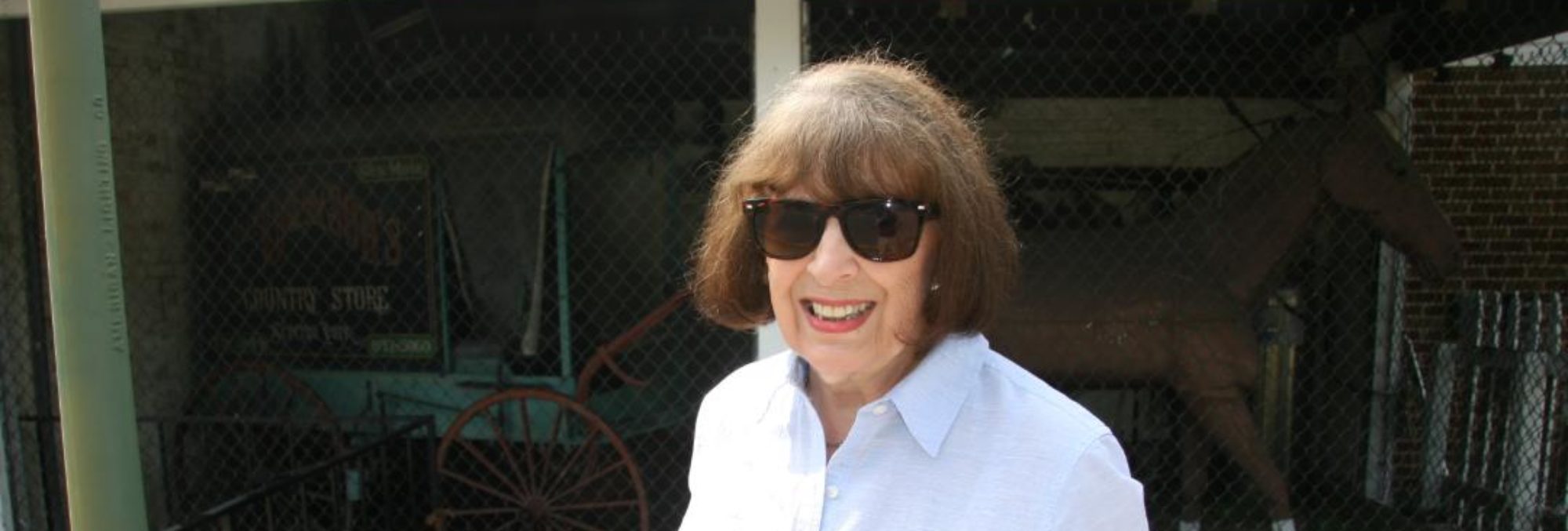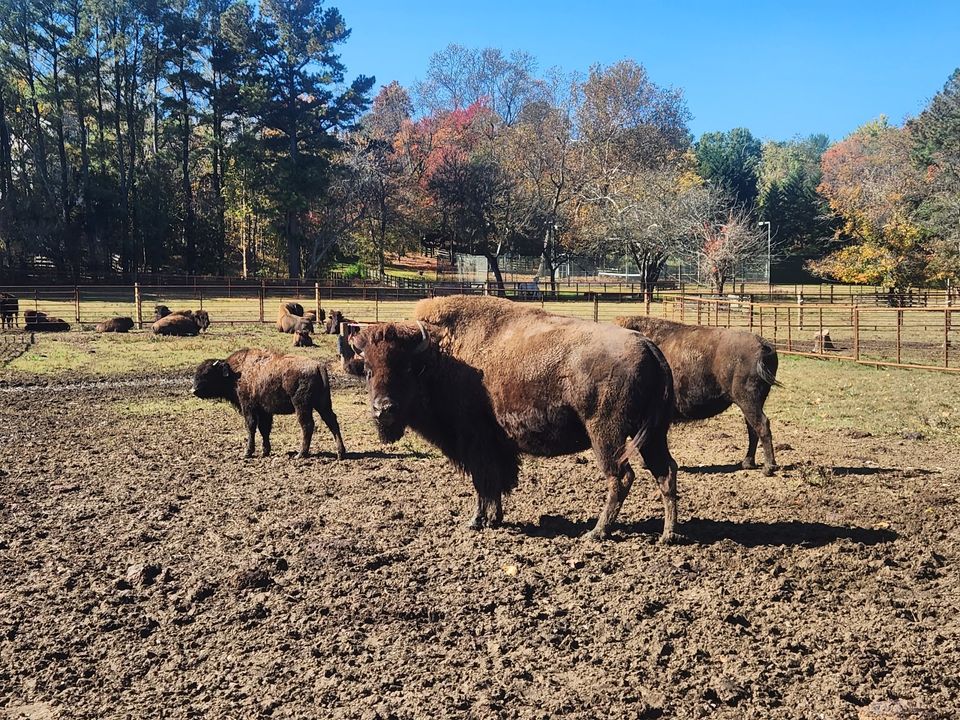AROUND THE PARK AGAIN by Sharon Lee Tegler

Brought to you by Jing Ying Institute of Kung Fu & Tai Chi
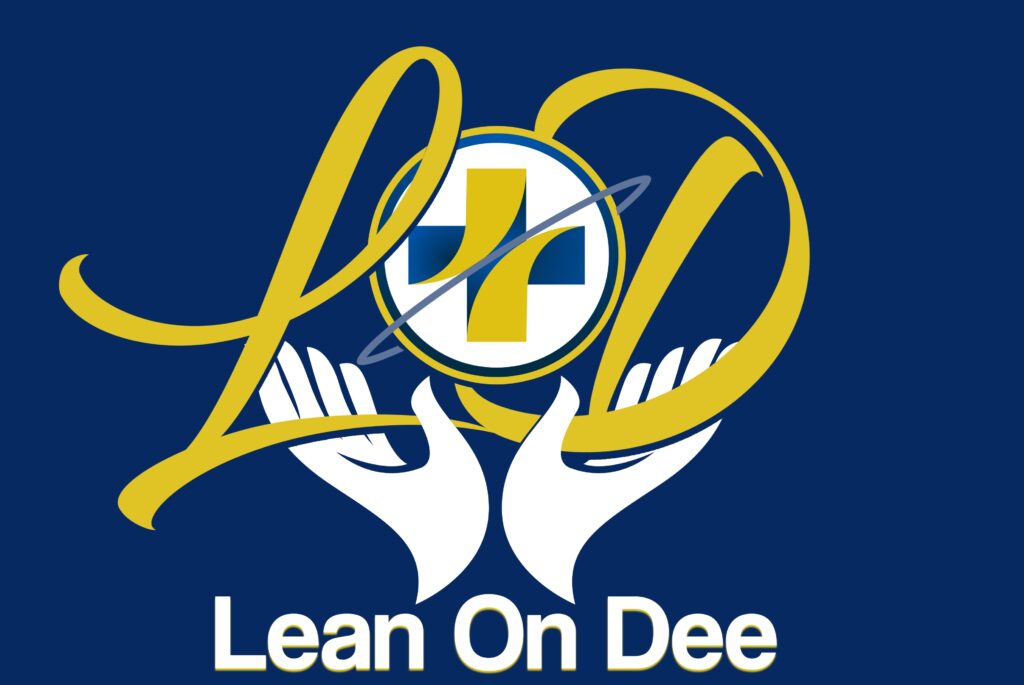
and Lean On Dee Senior Home Care Services
When Dr. Robert Graw, Jr. moved to Davidsonville to start a pediatric practice five decades ago, he had no idea he’d become well-known in agricultural and culinary circles as the founder and owner of three-generation family business Bow Tie Bison Farm.
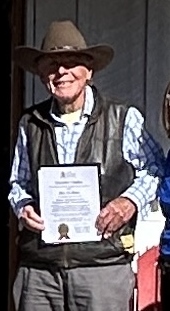
“When I came out here in 1972 after working at the NIH in Washington, D.C., the Davidsonville area was entirely rural with nothing but farms,” said Graw. “Not only were there no pediatricians, but no doctors with the exception of a family practice or two. One woman who had a practice in Harwood became famous for treating everyone for miles and miles around.”
Upon relocating to Davidsonville, the doctor initially didn’t see any children who could be patients. In fact, the Graws would ride on horseback from Davidsonville to the country store on Route 214 and rarely see anybody.
Fortunately, Graw went to a farm show at the home of Dr. Ben Watkins (the honorary mayor of Davidsonville) and was surprised to see many children there. He asked where the kids normally congregated and was told they were busy working on their family’s farms or were in school.”
About that time, people began telling Graw, “We need a doctor.”
He badly wanted to start his pediatric practice but needed to attract a clientele. While in medical school, he’d heard that, if you wanted to start a practice, you should put a sign in front of your house and people would drive up your driveway to find you. So, with approval from the Medical Surgical Society, he had a sign made up for the end of his farm’s driveway at 2427 Rutland Road off Route 224. It’s still there.
Sure enough, people started driving up the driveway. Dr. Graw and his wife used their living room as a waiting room and a bedroom upstairs as an exam room. Initially, patients were from the local farms. But, as the practice grew, people came from Annapolis, Washington and elsewhere.
Meanwhile, the Graws had always been interested in animals so they bought a couple of Black Angus cows, Billie and Molly and put them out front. The kids were crazy about them. Subsequently, they bought some different breeds of cows as well as goats and sheep and all kinds of other animals including peacocks and guinea hens. Then, as now, they had lots of litters of pigs.
“We added a wing to the house for the practice and found that, in the exam rooms, the parents had the kids standing on the windowsills looking at the animals,” the doctor said. “We continued the tradition and, about 15 years ago, a fellow who transported our animals when we bought or sent them to market asked if we’d like to own a bison. I said I’d love to.”
After reading all about bison, Graw figured out that they could be raised on his farm. A family on the Eastern Shore who’d had their own bison farm had access to the animals. So, he arranged through them to buy three bison – two females and a male.
“When our bison arrived at the farm, they were wild, truly primitive animals,” he said. “My farm hand Alberto Quintanilla and I had put up special fencing. Our normal fences were 45 inches tall and we’d added another 12 inches of electrified fencing. When the bison were delivered, they literally ran around the farm enclosure for an hour as fast as you can imagine. Alberto and I were bragging about the fences and the man who delivered the bison said, ‘Oh, that fence is not tall enough. They’ll jump a nine-foot fence.'”
The Graw farm started with those three bison and let them breed. Soon, they learned you’re not supposed to crossbreed them with cattle. But they’d already interbred and the Graws ended up with the breed referred to as Beefalo. With a higher fat content than purebred bison, Beefalo meat is reportedly better tasting. Nevertheless, the crossbreds were gradually weeded out.
In time, the farm had more and more bison and fewer cattle. It currently boasts a herd of 100 bison. Quintanilla and Graw have learned how to control the animals very well. There are strong metal fences and the herd is divided among different pens – babies in one, mothers in another, the big bulls in another….
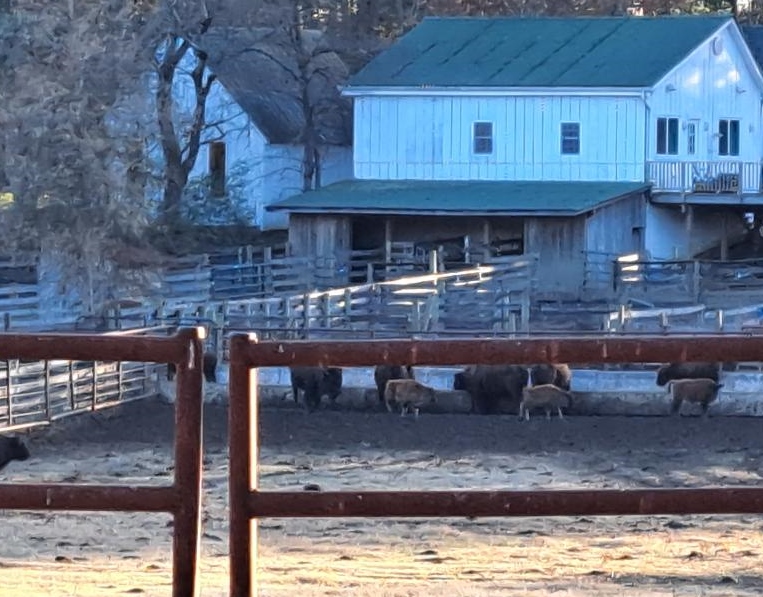
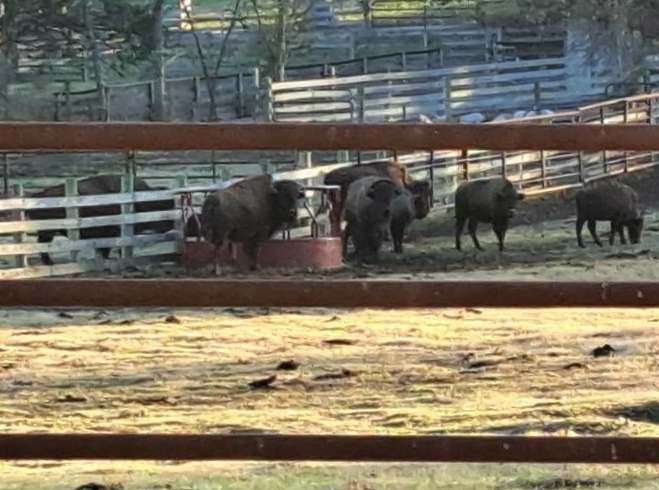
…and mothers and babies that are weaned are allowed to roam the grass pastures.
Currently, Bow Tie Bison Farm manager, Quintanilla feeds the bison beer grain. It’s grain left over from the brewing process and acquired from local breweries that is a valuable source of protein. The herd is also fed high protein mix along with cracked corn and silage from Davidsonville farmer Bob Chase who owns Chase’s Produce…and, of course, they get lots of hay and grass.
In 1989, Dr. Graul’s life took a bit of a turn when he started Nightime Pediatrics which progressed to become Right Time Medical Care with 20 locations. He still maintained the pediatric practice with five offices spread around Anne Arundel County. But the bison and other animals remained a high priority.
“About that time, people would come to us to ask if we’d ever sell a bison or sell the meat. So, Bow Tie Bison Farm was formed and began offering bison meat primarily to local restaurants. Today, there is a long list of restaurants the market regularly supplies.
The name Bow Tie Bison Farm comes from the fact that, as a pediatrician, Graw wore a bow tie so the name was suggested by his granddaughter Maddie during dinner one evening.
Bow Tie Bison sells the bison meat, pork, beef and fresh eggs from animals raised on the farm in a general store they call Boomer’s Market (named after the Graws’ first donkey). The range of prepackaged meats sold there is amazing. A selection of more than 30 cuts of bison ranging from stew meat, ground meat and sausages to steaks and brisket can be viewed and ordered online at bowtie-bison-farm-ranch (bowtiebison.com).
The market is open to the general public on Saturday mornings from 8 am till 12 noon. For most of the year, Boomer’s Market is open on Thursdays from 4 to 8 pm with hayrides and other activities taking place at the same time. However, it’s closed from November through March.
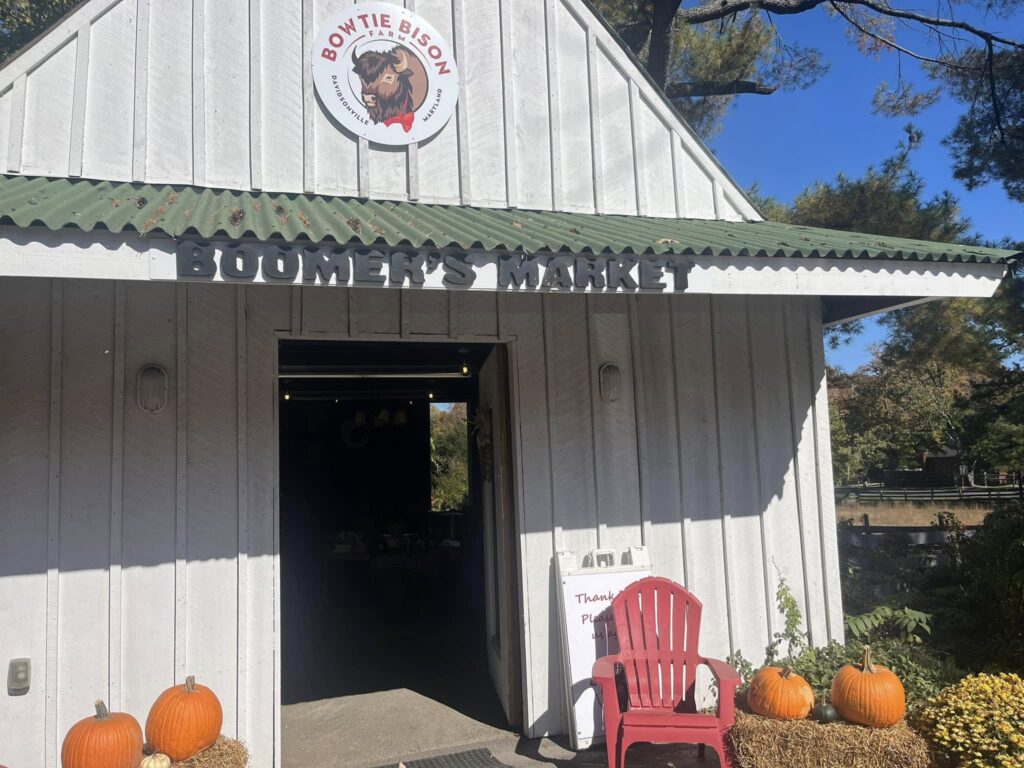
“Everybody loves the concept of having a high protein diet with less fat,” Graw enthuses. “We have young high school and college athletes that come to get the bison meat and, of course, many restaurants buy it and use it in all sorts of imaginative ways from bison stew and bison steaks and burgers to bison chili.”
Getting the bison meat butchered is a complicated, highly regulated process according to Graw. Producers are required to use a USDA butcher shop. Bow Tie Bison uses a couple – one in Pennsylvania and, more recently Haass Family ButcherShop in Delaware.
“They’ll do the butchering for us and then package it the way we want it and also supply bison quarters or halves for those who want them,” he said.
“I’ve loved being a pediatrician,” Graw says, “but raising bison is fun. It’s been wonderful seeing parents and children and grandchildren enjoying all the animals and touring the farm and going for our regular hayrides. There are even school groups.”
Graw’s second oldest son Bill, with 25 years in the restaurant business in California, played a big role in getting the farm and market operations started and running from day to day. His main focus currently is to breed and raise the bison on an all-natural diet. Graw’s granddaughter Mary and husband Chris Chase are responsible for Business Development working with restaurants and breweries throughout Maryland.
They are ably assisted by Delia Phibbons in Administration and, of course, Alberto Quintanilla, “the animal whisperer” as Farm Manager.
Graw tells us that the bison absolutely love the winter. They’re outdoor animals who have shelters but they don’t often go inside. On the plains, when it snows they’ll stand facing a snowstorm. In the summer, they like to roll around in the dirt to remove insects and then lie in the cooling mud.
After Graw sold his medical business (Right Time) he had time on his hands. His wife asked him what he’d like to do. He immediately answered “Bison”. However, he wanted to have a ranch. So, the Graws moved to a ranch in Colorado that he loves. They are raising Red Angus Cattle there with the help of five cowboys while maintaining the bison farm in Maryland. They’ll be heading back to the farm in December to stay for a bit and enjoy the family, the land, the bison and the other animals. Then they’ll return to the ranch in Colorado.
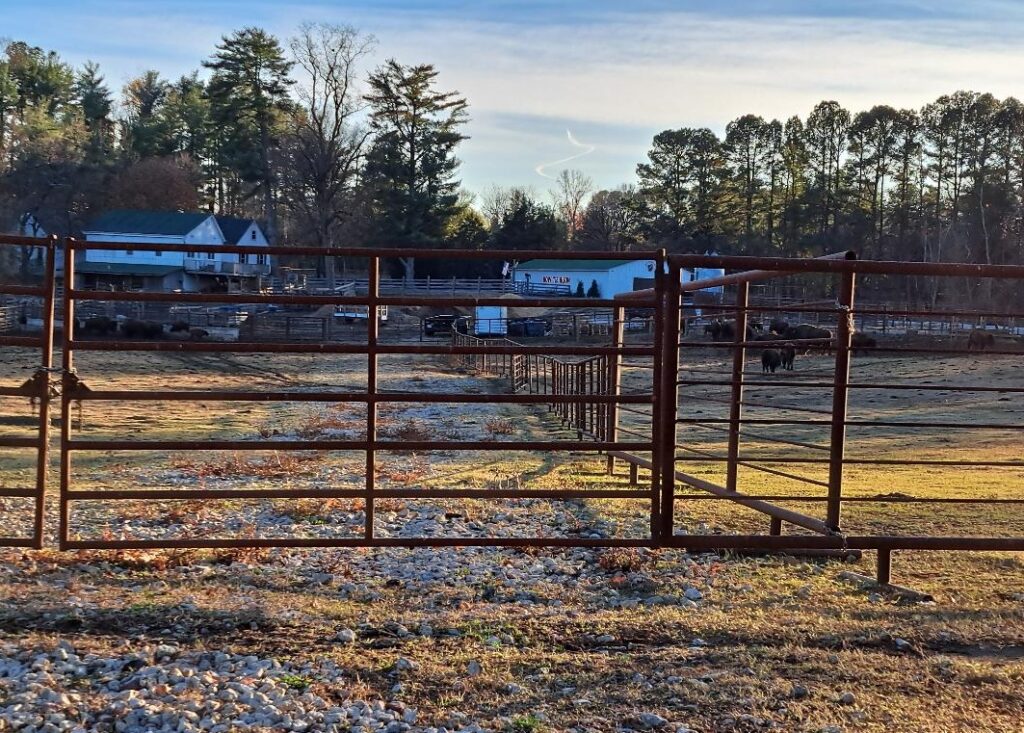
Chesapeake Harmony Chorus presents “Candy Cane Lane” on Sunday, December 8th
Chesapeake Harmony Chorus will perform its annual Holiday Show at Historic Baldwin Hall in Millersville on Sunday, December 8th beginning at 2 pm. (The doors will open at 1:30.) Themed “Candy Cane Lane”, the program will feature live performances by the Chorus as well as by the Bearfoot, 2nd Star and Moscato Quartets. There will be festive treats available and a special guest appearance by Santa. Tickets are $20 for adults, $15 for students and seniors and free for children under five. For information or to purchase tickets, visit Holiday Show 2024 — Chesapeake Harmony Chorus. Tickets may also be purchased at the door.
The Around The Park Again column is brought to you this week by Jing Ying Institute of Kung Fu and Tai Chi at 1195 Baltimore Annapolis Blvd. – For over two decades providing martial arts training that improves cardio-vascular health, strength and flexibility while reducing stress. Jing Ying is again bringing Tai Chi to the Severna Park Community Center.)

and by Lean On Dee Senior Home Care Services at 815 Ritchie Hwy., Suite 206 – When you need someone to lean on, Lean On Dee. Their experienced team of personal care management specialists and friendly companions provide high quality consistent care.

